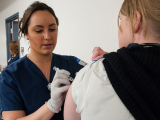Yesterday in JAMA, authors published promising results from a phase 3 trial on the safety and immunogenicity of a combined seasonal flu and COVID vaccine, Moderna's mRNA-1083, in adults 50 and older.
The mRNA-1083 vaccine comprises components of mRNA-1010, Moderna's vaccine candidate for seasonal influenza, and mRNA-1283, Moderna's next-generation COVID-19 vaccine candidate targeting Omicron XBB.1.5.
In total, 8,015 participants were enrolled in the phase 3 trial and vaccinated. Participants were split into two age cohorts (65 years and older and 50 to 64 years) who were randomly assigned to receive mRNA-1083 plus placebo, or coadministered licensed quadrivalent seasonal influenza (≥65 years: high-dose quadrivalent inactivated influenza vaccine [HD-IIV4]; 50 to 64 years: standard-dose IIV4 [SD-IIV4]) and COVID-19 (all ages: mRNA-1273) vaccines.
Overall, the combined vaccine was found to be non-inferior to standard seasonal influenza and COVID-19 vaccines.
Higher immune response in combined vaccine
For all ages, mRNA-1083, the combined vaccine, elicited higher immune responses than the standard-dose flu vaccine given to those 50 to 64 years, and for all influenza strains in the high-dose category. For all ages, the combined vaccine elicited higher immune response against SARS-CoV-2.
Though no serious safety concerns were seen, the combined vaccine did have more non-serious adverse reactions. The adverse reactions were numerically higher in frequency and severity after mRNA-1083 vaccination than comparators in both age cohorts, the authors said.
The mRNA platform to develop the combined vaccine has numerous advantages, the authors wrote, including avoidance of egg adaptation–related changes, as well as the breadth of immunity and T-cell responses for the influenza component (mRNA-1010).
Combination vaccines have the potential to reduce the burden of respiratory viruses on health systems and pharmacies,
In a statement from Moderna on the preliminary results of this trial published last summer, Moderna CEO Stephane Bancel, MBA, MS, said, "Combination vaccines have the potential to reduce the burden of respiratory viruses on health systems and pharmacies, as well as offer people more convenient vaccination options that could improve compliance and provide stronger protection from seasonal illnesses."


















